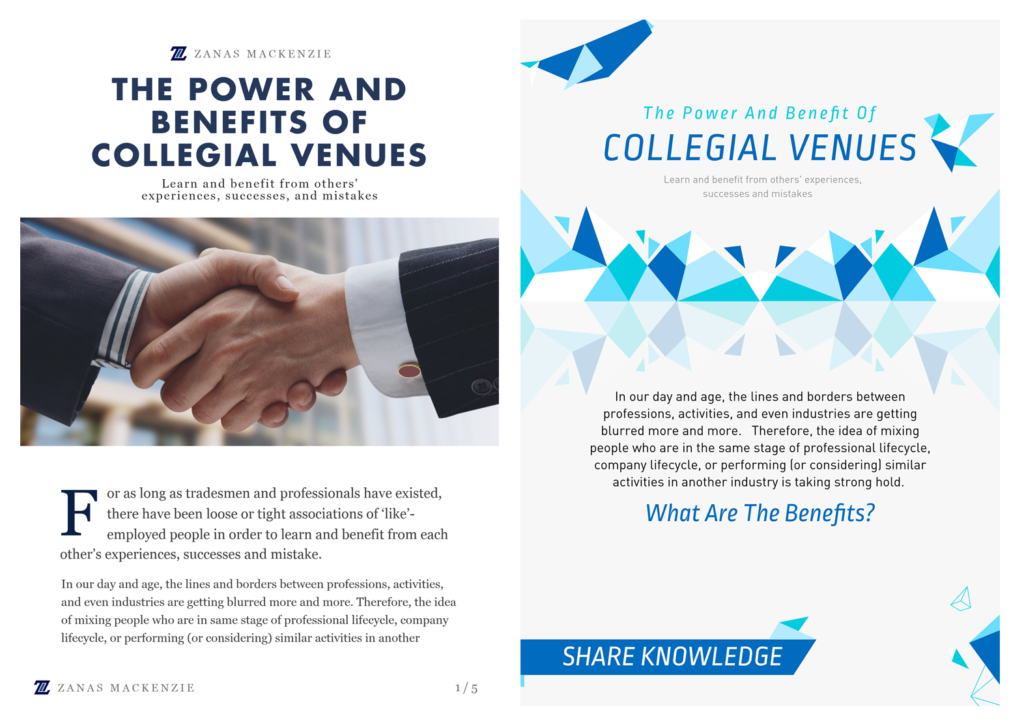Learn and benefit from others’
experiences, successes, and mistakes
For as long as tradesmen and professionals have existed, there have been loose or tight associations of ‘like’-employed people in order to learn and benefit from each other’s experiences, successes and mistakes.

In our day and age, the lines and borders between professions, activities, and even industries are getting blurred more and more. Therefore, the idea of mixing people who are in same stage of professional lifecycle, company lifecycle, or performing (or considering) similar activities in another industry is taking strong hold. What are the benefits of conducting these events?
- Sharing: This has always been the primary reason for people to get together with similar professionals, but has been influenced and dominated very significantly by technology evolution and advanced supply chain. In today’s world, it is entirely possible to adapt one industry’s business model to another with major or minor tweaks, enabled by technology and supply chain solutions. The opportunity to learn from others and apply the knowledge by far outweighs consideration of competition. Competition is now omnipresent and companies have learned to share and standardize what is similar between them and focus on what differentiates them instead.
- Exploring: New ideas in different industries and activities often stimulate new thinking in other areas, particularly in innovation and customer service. Many of these ideas can be applied to multiple industries. Companies that at first glance have nothing in common find out that in fact, there is more there than meets the eye. Collegial venues can expose themes to others (supply chain consolidation, customer service, digital transformation, business integration etc.). Much of these themes are transposable between industries or sectors.
- Investing: These venues are often the stimulus for investing in unexplored areas or incubation of new activities. Much of the innovation and transformation requires significant investment, particularly in developing countries or countries that lack sufficient infrastructure (or talent to execute). Companies further developed in the life cycle in one geography could be interested in helping in a less developed one, and reap the benefits while helping others grow.
- Partnering: Some companies may find it opportune to share parts of their business model (particularly in technology or supply chain), in order to defray the cost or pain to do it on their own. In addition, they may find there are additional revenue opportunities by working together more efficiently and openly.
All but the largest companies have the ability and budgets to invest in innovation, research and transformation. Collegial venues provide smaller companies a conduit to ideas, experience, talent, and investment.
What is The Best Way To Participate in Collegial Venues?
There are many companies that share similar issues and challenges as you do, whether in your own industry, or outside of it. Link up and partner with a consulting firm who specializes in helping startups and medium sized business, but have plenty international experience working with large corporations in a variety of industries. This type of consulting firm typically organizes theme events and round tables to a variety of clients who are similar to you. During these events, you will get introduced to topics and people who are interested in the same issues and share your pains.
Whoever you choose, you will want a consulting firm with the following qualities and characteristics:
- Local – located and rooted in Thailand and familiar with Thai culture and the way things work here.
- Networked – is in tune with the acute issues you face in your industry or functional specialty. Who can introduce you to like-minded people and help you collaborate with them.
- In Tune – who anticipates your needs and interact with you on a pro-active basis
- Reliable – able to help you follow through on potential collaboration.
Above all, you will want someone you can trust. Who lives and works where you live and work. Who understands what is possible in your environment. And who can be available for you when you need them. It might just be right for you.
Spread the word
Co-founder and Managing Director

Patriek has more than 30 years of working with consulting and technology giants (Andersen, Unisys, IBM) and start-ups in many industries across three continents. He has been in Asia since 2005. First in mainland China, Taiwan, and Hong Kong. Since 2012, he lives and works in Thailand, with extensive work experience and responsibility for South East Asia.
As a result of all of these experiences, Patriek’s passion for helping companies embrace and benefit from change led him to create a new company with a unique approach to unlocking value.
Patriek focuses on operational strategy and change management. He obsesses about delivering value from within through business transformation and integration. At Zanas MacKenzie, Patriek is primarily responsible for business strategy and business development.
Free White Paper & Infographic




